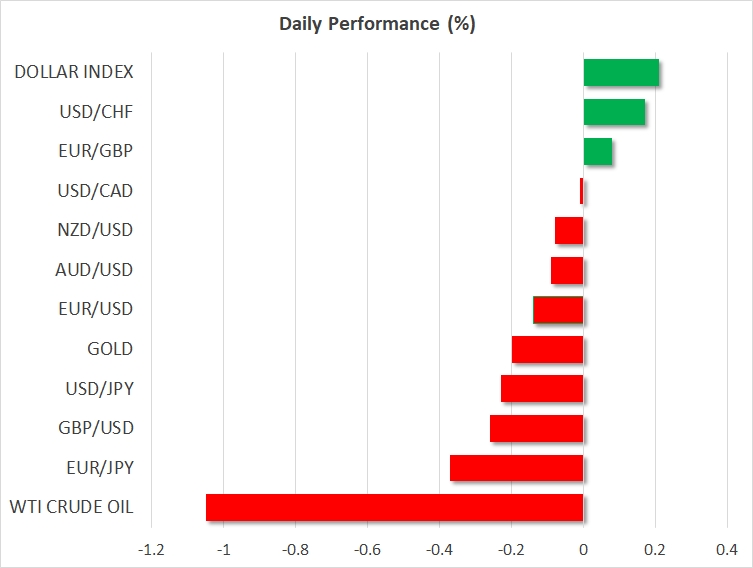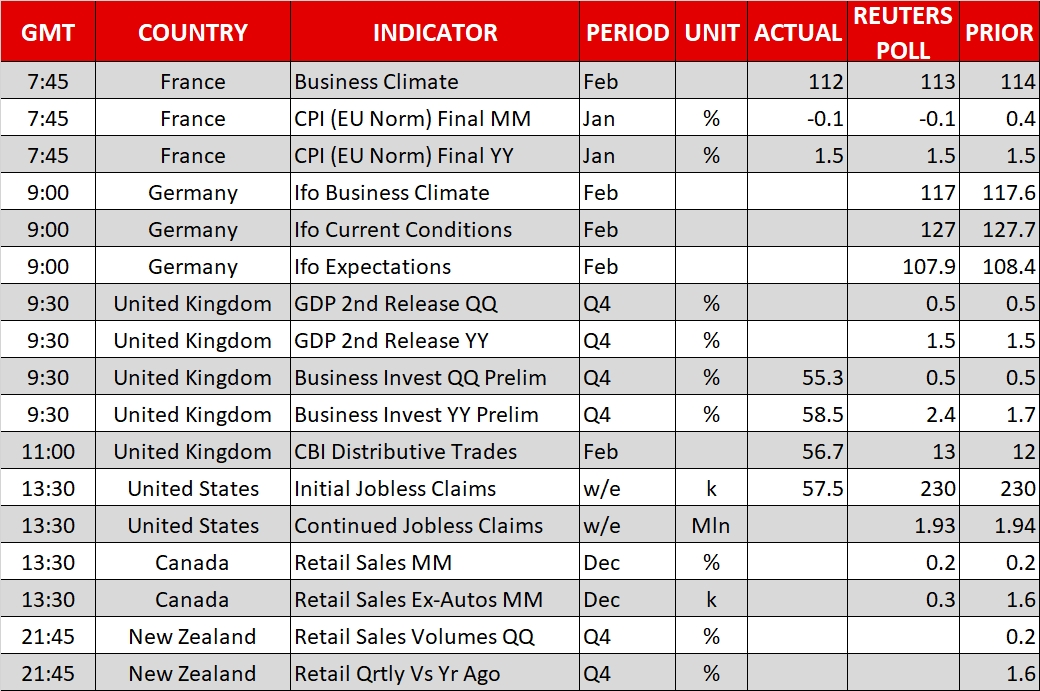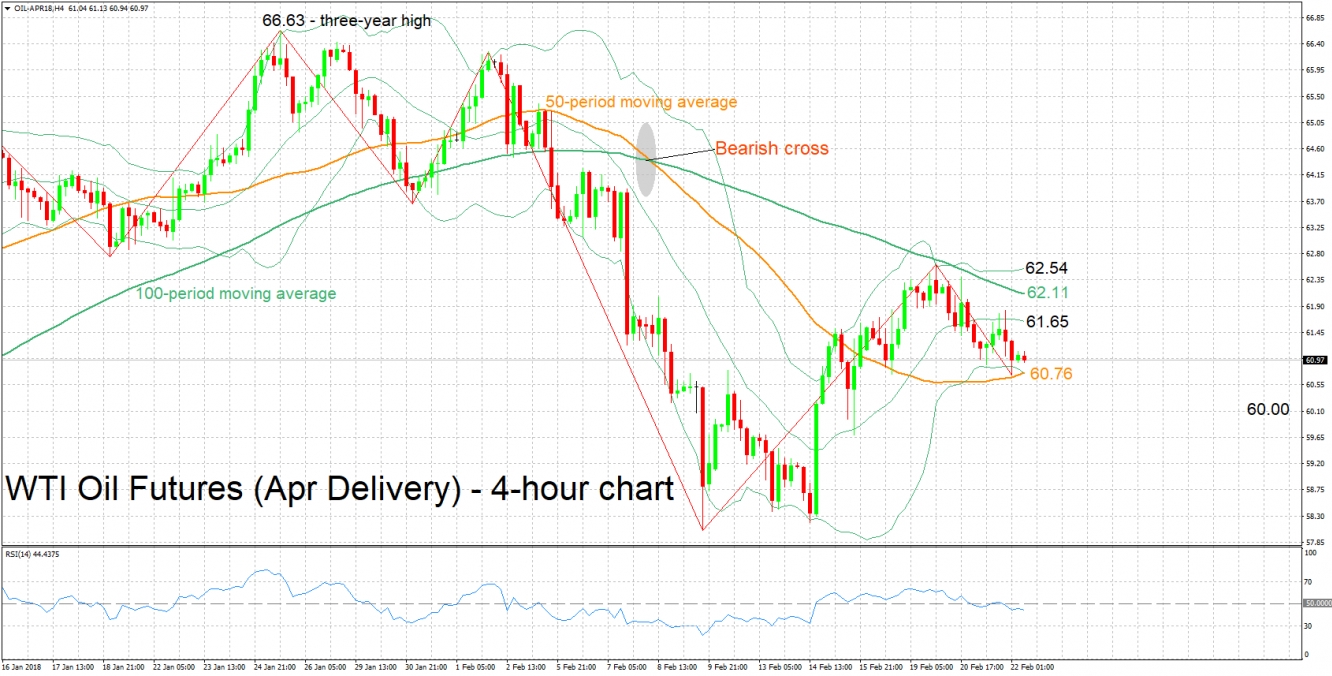Here are the latest developments in global markets:
· FOREX: The dollar index was 0.2% higher on Thursday, adding to the notable gains it posted yesterday on the back of the Fed minutes from the January meeting, which were quite upbeat. The greenback moved in tandem with US Treasury yields, which surged across the board in the aftermath of the minutes to reach fresh multi-year highs.
·STOCKS: US markets took a hit from the Fed minutes, as speculation for faster rate hikes and higher Treasury yields weighed on risk appetite. The Dow Jones fell 0.7%, while the S&P 500 followed in its tracks, declining 0.6%. The NASDAQ Composite pulled back only by 0.2%. Moreover, futures tracking the Dow, S&P, and NASDAQ 100 are all flashing red at the time of writing, suggesting that volatility will probably remain the dominant theme in equity markets for a while more. The negative sentiment spilled over to Asia as well, with Japan’s Nikkei 225 and TOPIX falling by 1.1% and 0.9% respectively, while Hong Kong’s Hang Seng index declined 1.3%. The exception to this pattern were Chinese markets, which on their first day back from holidays posted significant gains. In Europe, futures tracking the major equity indices were a sea of red.
· COMMODITIES: Oil prices plunged as the dollar strengthened. WTI is down by almost 1.1% while Brent crude is trading lower by 0.9%, even despite the private API inventory data overnight surprisingly reporting a drawdown in US stockpiles. Today, the oil market will turn its sights to the official EIA inventory data, for a fresh indication of whether US production continues to soar higher. In precious metals, gold is 0.2% lower as well, last trading near $1321/ounce as the firmer greenback made the dollar-denominated metal less appealing.
Major movers: Dollar gains as the dust settles after Fed minutes; BoE expects wages to surge
Yesterday, the Fed released the minutes from the latest FOMC meeting. The tone of the minutes was rather upbeat on practically every front. On economic growth, “most” policymakers judged that recent data suggested a stronger near-term outlook than they had anticipated previously. On inflation, “most” members noted it would likely move up in 2018 and stabilize around its 2% target over the medium-term, with only “a couple” of officials expressing concerns on that prospect.
Overall, the minutes painted a picture of a Fed that is becoming increasingly more confident on the economy, even though this meeting took place before the surprising acceleration in wages and the stronger-than-anticipated inflation prints for January. Without saying so clearly, the minutes left the door open for the scenario of four rate hikes this year, something that could be signaled as early as at the March meeting, provided the economy remains on a strong path. While the knee-jerk reaction in the dollar was lower at the release, the currency quickly recouped all of its losses to trade much higher in the following hours.
Despite this rebound in the greenback though, one must sound a note of caution and reiterate that the broader narrative remains one of USD weakness, amid concerns regarding widening US deficits and longer-term debt sustainability. For this narrative to change and the dollar’s downtrend to reverse, it may take something bigger than simply a more upbeat tone in the Fed minutes. In this respect, markets will pay very close attention to Jerome Powell’s testimony before Congress next week. The remarks of the new Fed Chair could be the biggest determinant of expectations over what the Fed is likely to deliver this year and thus, the dollar’s overall direction.
Sterling/dollar experienced a very busy session yesterday, amid data releases and some remarks from BoE policymakers. The pound fell initially after the UK unemployment rate surprisingly rose, though wages did pick up some speed. Meanwhile, BoE Governor Mark Carney and three other policymakers testified before Parliament. While most comments were a reiteration of what was said at the latest BoE meeting, the officials did deliver a few fresh points, such as the fact that they expect wages to reach 3% soon.
Day ahead: UK GDP, ECB minutes, US jobless claims and Canadian retail sales among Thursday’s releases
Thursday’s calendar features numerous releases that could spur positioning in the markets.
At 0900 GMT, the Ifo Institute for Economic Research will release numerous surveys gauging business sentiment in Germany, Europe’s largest economy. All relevant indices – Business Climate, Current Conditions and Expectations – are projected to decline in February relative to January’s respective readings, though not by much.
The UK will see the second release of Q4 2017 GDP growth at 0930 GMT. The pace of growth is forecast to remain unchanged at 0.5% and 1.5% on a quarterly and annual basis respectively. Beyond GDP numbers, data on investments by businesses in Q4 2017 will also be made public at the same time, while the Confederation of British Industry’s Distributive Trades figure for the month of February is due at 1100 GMT. The latter attempts to measure the change in the volume of orders placed on suppliers during a given month – in this case February – versus the same month a year ago.
The European Central Bank will release its account of the monetary policy meeting that took place in January at 1230 GMT. The minutes from the December meeting took markets by surprise by being more on the hawkish side of the spectrum than markets expected, leading to a rally in the euro. It would be interesting to see if today’s release builds on the “hawkish momentum”, propelling the single currency higher.
US initial and continued jobless claims data for the week ending February 17 are scheduled for release at 1330 GMT. Individuals applying for unemployment benefits for the first time are yet again expected to remain below the 300k threshold that’s associated to a healthy labor market. Specifically, projections are for the number to stand at 230k, the same as in the week that preceded.
Of importance out of Canada will be retail sales figures for the month of December due at 1330 GMT. New Zealand will also see the release of retail sales numbers for Q4 2017 at 2145 GMT; kiwi pairs would be eyed.
Policymakers making appearances include ECB board member Yves Mersch who is scheduled to give a speech at 0930 at the European Banking Federation’s executive committee meeting in Frankfurt. New York Fed President William Dudley – a permanent FOMC voting member – will be participating in an economic briefing on the impact of hurricanes Irma and Maria in Puerto Rico and the Virgin Islands at 1500 GMT. Atlanta Fed President Raphael Bostic – a voting FOMC member in 2018 – will be speaking on Banking at 1710 GMT, with Dallas Fed President Robert Kaplan – a non-voting FOMC member in 2018 – participating in a Q&A session on NAFTA at 2030 GMT.
The Energy Information Administration’s (EIA) report including information on US crude and gasoline stocks for the week ending February 16 is scheduled for release at 1600 GMT. Crude inventories are anticipated to increase by around 1.8 million barrels in the period of coverage – around the same as in the previously tracked week – recording their fourth straight weekly rise.
Technical Analysis: WTI oil futures hit one-week low; RSI halts decline
WTI oil futures for April delivery are currently trading not far above 60.72, this being a one-week low recorded earlier in the day. Despite this, the RSI seems to have halted its decline, moving sideways for the most part and projecting a mostly neutral short-term picture.
If the Energy Information Administration’s weekly report shows a smaller-than-anticipated increase in US crude oil inventories, prices could advance. In this scenario, resistance could come around the middle Bollinger line – a 20-period moving average line – at 61.65. Further above, and given stronger bullish movement, the attention would shift to the area around the current level of the 100-period MA at 62.11.
On the other hand, should crude inventories rise by more than projected, then prices could post losses. In this case, the area around the current level of the 50-period MA at 60.76 might provide support. Notice that the lower Bollinger band coincides with the 50-period MA. A downside violation would turn the attention to the 60 handle, this being a level of potential psychological significance.



